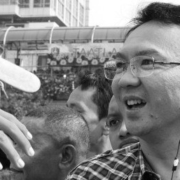
Photo by Toto Santiko Budi/AAI
Although Indonesia has the world’s fourth largest population (270 million) and is a close neighbour of Australia’s, few Indonesians live in Australia. In fact, Australia’s Indonesian diaspora community ranks 19th by size, behind much smaller countries like Scotland, Sri Lanka and Ireland and even other nearby countries like Malaysia and the Philippines. There are only about 90,000 Indonesians living in Australia, and about one-fifth of them (18,000) are students.
Many students and other young members of the Indonesian diaspora report feeling major cultural tension as they move between the two countries, and some even experience significant identity shifts. Understanding these tensions can help us understand why so few Indonesians stay long-term in Australia, as well as what helps them feel at home when they are here.
I interviewed nine young Indonesians living in Australia, aged between 18 and 25. It was clear that language, ethnicity and belonging, and religion are among the key points of cultural tension and identity changes they experienced.
For most of them, Indonesian language skills – maintaining and developing them, and actively seeking opportunities to practice them – were an important means of staying connected with Indonesian culture. One young Indonesian, James*, told me:
“I feel like I’m a different person when I’m talking Indonesian. To speak another language is to assume the cultures and the ideas, the concepts and the philosophies of that language too, and I feel like I notice when I speak Indonesian there are a lot of words that don’t translate in English. It makes me remember how I used to think, which I kind of want to still do.”
James says he watches Indonesian videos to maintain his language skills while in Australia, but still feels that he is losing proficiency. This makes him feel out of touch with Indonesia, where he was raised until age 16. He has felt his identity shift to a space between “Indonesian” and “Australian”. This was a common experience.
In fact, many young Indonesians living in Australia find that they struggle to reach the standard of formal Indonesian expected for their age and education level. As a result, they report feeling uncomfortable speaking formal Indonesian, and disconnected from a sense of “being Indonesian”.
Interestingly, others report feeling far more comfortable speaking Indonesian in Australia than in Indonesia, as their comparatively lower proficiency in formal Indonesian becomes less of a stressor. For this group, speaking imperfect Indonesian together even acts as an unlikely means of connection.
A sense of ethnicity and belonging also seems to shift as young Indonesians move between Indonesia and Australia. When people in Australia ask, “Where are you from?” they most commonly answer “Indonesia”. But when young Indonesians travel to Indonesia, that question becomes much harder to answer.
For some, the difference between their cultural experiences in Australia and the new identity they have developed there on one hand, and the culture of Indonesia on the other, makes them feel very “Australian” when they travel to Indonesia. For others, it’s more of a homecoming to their “Indonesian” identity. One young Indonesian, Helena, explains:
“I feel more Indonesian when I’m in Indonesia because I feel like I’m surrounded by the culture and I understand the food, I understand the people, I understand the language. I feel more Indonesian there, and when I’m here I feel more Westernised.”
Helena says that whether in Indonesia or Australia, she feels most “Indonesian” when she is practicing the culture, eating the food and speaking the language, usually during religious practice or cultural festivals.
My interview subjects were Catholic or Muslim, although many other religions are practiced in Indonesia. Most of the young diaspora report feeling far more in touch with their religious identity when they are in Indonesia. This seems to be tied to the significant role religion plays in Indonesian culture, and the more visible nature of religious identification and practice there than in Australia. One respondent, Imran, says:
“It just seems like [Indonesia is] catering towards that aspect of my life instead of putting it to the background, it feels like a really pivotal part when I’m in Indonesia.”
However, others say they feel less in touch with their religious identity in Indonesia when they are confronted with conservative religious views. Indonesia has experienced a recent surge in the prevalence of conservative Islam, and for some, facing this difference produces a sense of disconnect. Vina, a young Muslim, says she feels “less Muslim” when in Indonesia than in Australia:
“From what I know, from the information that I have through family, I like the foundations of Islam, but I feel like Indonesia is getting increasingly conservative, and I don’t like the extent to which Islam is controlling people’s lives, especially my family’s lives, if that makes sense. Because I know the last time we were in Indonesia my dad was praying at the mosque and he said that the Imam said to not shake hands with a Christian person because you were deviating from God, and he was like ‘hold up, what?’”
While the outcomes are not always the same, there is a common thread among the experiences of the young Indonesians I spoke to: being in Indonesia or Australia is a significant informer of their identity, and often challenges them significantly.
It is also clear that language acts as a way to connect with Indonesian heritage when moving between the two countries, while a sense of ethnicity and belonging, as well as feelings of religiosity, often differ depending on location.
Each of these points contribute to the formation of an identity that is unique to the Indonesian youth diaspora in Australia, but they also seem to create challenges for Indonesians contemplating leaving the land of their birth and making a home in Australia.
*All names mentioned are pseudonyms.











